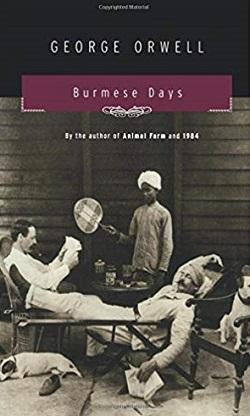Summary

Burmese Days
by George Orwell
Set in the days of the Empire, with the British ruling in Burma, Orwell's book describes corruption and imperial bigotry. Flory, a white timber merchant, befriends Dr Veraswami, a black enthusiast for the Empire, whose downfall can only be prevented by membership at an all-white club.
.
Read
Burmese Days on http://kissnovel.net
Martial Peak Reviews
Burmese Days, published in 1934, is George Orwell's incisive critique of British imperialism, set against the backdrop of colonial Burma. The novel is not merely a story about a white timber merchant named Flory; it is a profound exploration of the moral decay and hypocrisy that underpin the British Empire. Through its vivid characters and intricate plot, Orwell lays bare the complexities of colonial rule, exposing the deep-seated racism and corruption that permeate both the colonizers and the colonized.
At the heart of the narrative is Flory, a disillusioned Englishman who embodies the contradictions of colonial life. Flory is portrayed as a man caught between two worlds: he is a product of the Empire, yet he is increasingly repulsed by its values. His friendship with Dr. Veraswami, a native doctor who fervently supports British rule, serves as a focal point for the novel’s exploration of loyalty and betrayal. Veraswami's desire to gain acceptance into the all-white European club symbolizes the desperate lengths to which individuals will go to secure their place within a system that ultimately devalues them.
Orwell's depiction of the club is particularly striking; it becomes a microcosm of imperial society, where racial prejudice and elitism thrive. The club members, characterized by their arrogance and ignorance, represent the worst aspects of colonialism. They are not just oppressors; they are also deeply insecure individuals who cling to their power and privilege. This dynamic is encapsulated in the character of Macgregor, the club's president, who embodies the toxic masculinity and bigotry that Orwell critiques throughout the novel. The club serves as a constant reminder of the barriers that exist not only between the British and the Burmese but also among the British themselves.
One of the most compelling themes in Burmese Days is the notion of identity. Flory's internal struggle reflects a broader existential crisis faced by many characters in the novel. He grapples with his own sense of self-worth and morality, often finding himself at odds with the values of his peers. This conflict is poignantly illustrated in his relationship with Elizabeth Lackersteen, a young Englishwoman who arrives in Burma with her own prejudices and expectations. Flory's attraction to Elizabeth is complicated by his awareness of her superficiality and the societal norms that dictate their interactions. Their relationship ultimately highlights the futility of seeking genuine connection within a framework of colonial oppression.
Orwell's narrative is rich with symbolism, particularly in its portrayal of the Burmese landscape. The natural beauty of Burma stands in stark contrast to the moral ugliness of colonial rule. Orwell uses vivid descriptions of the environment to evoke a sense of longing and loss, suggesting that the true essence of Burma is being eroded by the presence of the British Empire. This juxtaposition serves to reinforce the idea that imperialism is not only a political and economic endeavor but also a cultural and spiritual one, leading to the degradation of both the colonizers and the colonized.
The novel's climax is both tragic and inevitable, as Flory's attempts to navigate the treacherous waters of colonial society culminate in a devastating betrayal. The choices he makes reflect the broader themes of complicity and resistance within the colonial framework. Orwell does not offer easy answers; instead, he presents a complex moral landscape where characters are forced to confront their own complicity in a system that dehumanizes others. Flory's ultimate fate serves as a poignant reminder of the personal costs of imperialism, both for the oppressor and the oppressed.
In comparison to other works that tackle similar themes, such as Joseph Conrad's Heart of Darkness or E.M. Forster's A Passage to India, Burmese Days stands out for its unflinching portrayal of the everyday realities of colonial life. While Conrad's narrative delves into the psychological impacts of imperialism, and Forster's work explores the complexities of cultural exchange, Orwell's novel focuses on the moral decay that arises from the power dynamics inherent in colonialism. Each of these authors offers a unique perspective on the imperial experience, but Orwell's direct and often brutal examination of the characters' motivations and actions sets Burmese Days apart as a seminal work in the canon of colonial literature.
Overall, Burmese Days is a powerful and thought-provoking novel that remains relevant in today's discussions about race, identity, and power. Orwell's incisive prose and keen observations challenge readers to reflect on the legacies of colonialism and the moral implications of their own actions. The novel serves as a stark reminder that the impacts of imperialism are not confined to the past; they continue to resonate in contemporary society. As such, Burmese Days is not only a historical account but also a timeless exploration of the human condition, making it a must-read for anyone interested in the complexities of power, identity, and morality.








![A Deal With My Fake Husband [Official]](/upload/pic/manga/a-deal-with-my-fake-husband--official-.jpg)















Reviews 0
Post a Reviews: